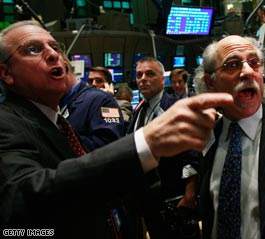NEW YORK (CNNMoney.com) -- President-elect Barack Obama is expected to nominate New York Federal Reserve President Timothy Geithner for Treasury Secretary.
Two sources close to the transition told CNN on Friday that Geithner is "on track" to be offered the post. An announcement is expected within days.
Geithner has played a central role in the government's efforts to wrangle the credit crisis, which has damaged markets and economies worldwide. While a number of those efforts have been controversial, Geithner remains a well-regarded figure from Wall Street to Washington.
In the wake of the Geithner news, stocks soared in late-day trade on Friday. The Dow closed nearly 500 points higher, pushing back above 8,000, after a dismal week.
Many believe the post of Treasury Secretary will be the most important in the next administration's cabinet. And indeed, Geithner would inherit one of the toughest jobs in Washington.
Geithner would be charged with restoring stability to the financial markets, the banking system and the housing sector through oversight of the controversial $700 billion financial rescue package, of which about half is still available for use at the discretion of the Treasury Secretary.
He would also be chief overseer of the international push to reform the regulatory regime for the financial system, which, like a sputtering lemon on the autobahn, has been severely outrun by 21st century developments in financial practices and products.
His overarching task: Ensure that what happened to world markets and economies in the fall of 2008 never happens again.
In the span of just two months, Americans and investors around the world have lost trillions in wealth, economies have fallen into recession like dominoes and the current prospects for recovery are insufficient to offer comfort. All the while, the foreclosure beat goes on, with roughly 165,000 more Americans losing their homes in September and October, bringing the total to 936,000 since August 2007.
Expect Geithner, if nominated, to roll up his sleeves and get busy even before his confirmation hearings with Congress, which could come before Inauguration Day.
Henry Paulson, the current Treasury Secretary, has indicated that he's reserved office space for his successor so that the Bush and Obama Treasury teams can work closely to insure a smooth transition during what has become the most tumultuous period for the U.S. financial system and economy in recent history.
What Geithner brings to the job
Often described as brilliant but modest, Geithner, 47, has held for the past five years one of the most powerful, if little known, jobs in the country as president of the New York Federal Reserve. His post at the New York Fed is essentially one of Wall Street watchdog. He also sits on the Federal Open Market Committee, which sets the country's monetary policy.
Geithner was the U.S. Federal Reserve's point person on the rescue of Bear Stearns and American International Group (AIG, Fortune 500) as well as in the failed talks to keep Lehman Brothers out of bankruptcy.
Lehman's demise is blamed by many for the freeze up in global credit markets that followed immediately afterwards.
He is typically cited as one of the few people on or off Wall Street who can begin to untangle the murky and unregulated market of credit default swaps, the so-called "side bets" that felled AIG. He has pushed for greater transparency and the creation of a central clearinghouse where credit default swaps could be recorded and secured. And, according to Fortune, he has gotten informal promises from banks that they would participate.
Prior to joining the Fed, he served as director of policy development and review at the International Monetary Fund. Before that, he was the under secretary of the Treasury for international affairs under Treasury Secretaries Robert Rubin and Lawrence Summers.
His is an international background, which would come in handy at a time when G-20 governments have pledged to coordinate efforts to dig out their economies and markets. Geithner has lived in China, Japan, Thailand, India and East Africa. He got his bachelor's from Dartmouth in government and Asian studies and his master's in international economics and East Asian studies from Johns Hopkins School of Advanced International Studies.
Indeed, during his years at the Treasury, he played a central role in the agency's handling of international crises. A profile of him in The New Republic asserted that without his influence "the '90s might have looked very different ... [His role made him] Treasury's first-responder to foreign-currency emergencies, like the kind that plagued East Asia throughout the decade."





